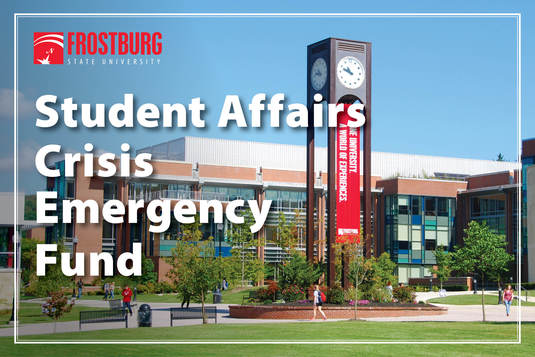Student Affairs Crisis Emergency Fund Set Up for Frostburg Students
The Office of Student Affairs at Frostburg State University and the FSU Foundation, Inc. have partnered together to create a Student Affairs Crisis Emergency Fund which seeks to provide aid to enrolled students who are experiencing an immediate financial emergency as a result of an unexpected event, such as the COVID-19 pandemic. The fund reports that “100% of all gifts will support our students’ most pressing needs.”
As of press time, 74 donors have contributed $15,600 to the fund. Many donors have given from afar, including from Arizona and Florida, according to the GiveCampus website. Many of the named donors are faculty/staff members and campus administrators, including President Ronald H. Nowaczyk.
Similar emergency funds have been established at each of the 12 University System of Maryland campuses, and the USM Foundation is also accepting donations.
Dr. Artie Travis, Vice President for Student Affairs, says he emailed the Frostburg Foundation last month to inquire about whether a fund like this was possible. Dr. Travis joined the FSU Administration in January 2020 after serving in the same capacity at Bowie State University, where he says an emergency student relief fund had been previously established.
“I am so proud of the Frostburg community for their generous donations. On Monday, the first call for donations went out, and I am not a fundraiser, but I think $14,000 is a lot for a week,” says Travis.
The call Travis is referring to was an email sent by John T Short Jr., Vice President for University Advancement and Executive Director of the FSU Foundation on Monday, March 30.
President Nowaczyk officially announced the fund on Friday, April 3 in a campus-wide email. He says the “fund assists students with critical emergencies, excluding tuition-related expenses, which jeopardize a student’s ability to remain a student.” Nowaczyk also provided a link to the online application in his email.
Travis says that applications will be reviewed by a seven-member committee beginning on Monday, April 6. Within the first hour of the application period, Travis reported that “over 50 requests [had] come in.”
The committee will review applications on a rolling basis, and there is not a deadline to apply. This is due to the fund’s nature, says Travis. “This fund prioritizes true emergencies versus what could be on hold,” he remarked.
For example, requests for funds to cover utility bills may not be considered a priority as Maryland Governor Larry Hogan announced on March 16, 2020 that the termination of residential services by utility providers is prohibited.
“But say that an older student with three children who lost their part-time job at a local restaurant needs food that the PAWS Pantry can not provide, like infant formula, then that would be considered priority,” says Travis.
Thus, Travis suggests students who are applying for assistance be as specific as possible in their requests and are encouraged to share with the committee any efforts they’ve made to mitigate their own circumstances.
The cap for a single request is set at $1,000. Travis says a check from the FSU Foundation can be cut in 2-10 days.
“However, maybe everything doesn’t need a check,” says Travis. “For example, if a student needs food outside of what the PAWS Pantry can provide, we are working to see if maybe we can send them a gift card to Wal*Mart, or if they can provide an invoice for a specific need, we may be able to address those emergencies in real-time.”
Moreover, students are not limited to making one request. Travis says, “a second request would be considered but should meet the level of an emergency.”
In addition to the Student Affairs Crisis Emergency Fund, Nowaczyk outlined other financial opportunities for students experiencing hardship due to COVID-19 in his April 3 email. These include the Forever Frostburg Scholarship and the Unfinished Business Scholarship. He also announced that the University is waiting on federal guidance on the Coronavirus Aid, Relief, and Economic Security Act (CARES) which may include assistance for students.
If you are a student in need, the application form for the Student Affairs Crisis Emergency Fund can be found here.
If you wish to donate to the fund or learn more, the GiveCampus link can be found here.




